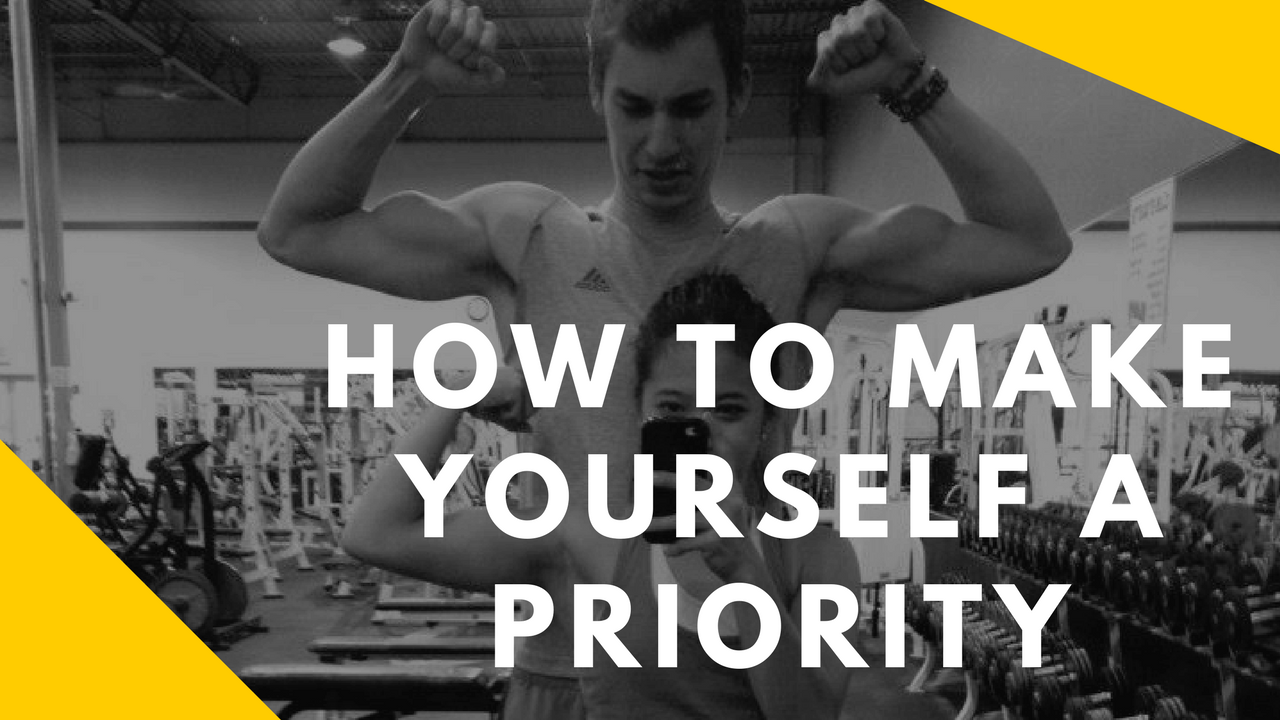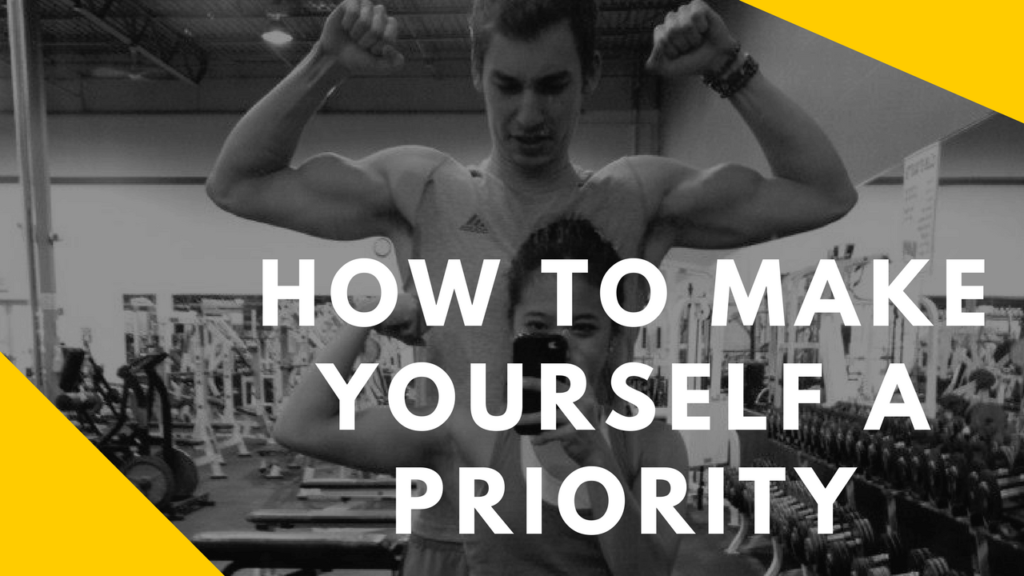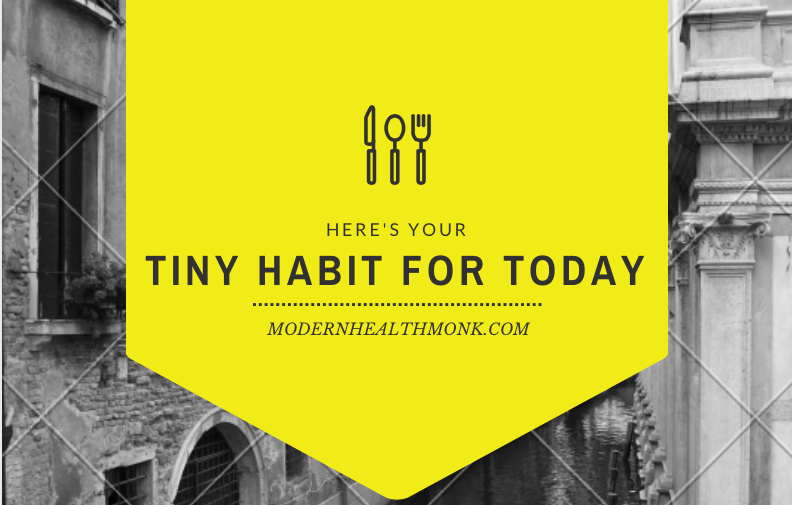
How to Make Yourself Awesome (And Your Health a Priority)

Why do we self-sabotage? Why do we do things that we know are not aligned with our long-term goals…and do them anyway?
After working with many, many coaching clients, one consistent trend comes up repeatedly as to why people don’t reach their goals: they don’t prioritize themselves.
In this article, we’re going to jump into why we prioritize other people or other things over ourselves, what’s behind it, and what we can do about it.
Making Yourself Freaking Awesome (The Priority)
Why We Self-Sabotage: The Self-Identity Precedes Action

I’ve been thinking a lot recently about why so many of us don’t do the things we know can change our life.
I once had this coaching client who was a super busy mom. Her husband had a disability, so she was the breadwinner of the family. She had kids to watch after, and she had an absolute ton on her plate.
Because she had so much to do, she never took the time to take care of herself. When I talked to her, she would just say things that she didn’t realize like, “I just don’t have the time for this.”
“They need me more than I need to take care of myself.”
“I don’t have the luxury of putting myself first. They need me more.”
She had the belief that other people needed her more, so of course, she would always act in alignment with that belief. As a result, she never chose herself first.
This goes back to that Maxwell Maltz concept that our self-identity precedes action. She believed that she really needed to put them first, because there was no way she could both help herself and her family.
Since she really believed that, her actions, therefore, were in alignment with what she believed. There was no way we could get her to improve her results, because she was confident that other people needed to come first
We couldn’t unwind it because it was her identity. It was first a belief—a mindset—that became who she was and then her actions followed suit.
The first thing to observe is if you have some kind of inner narrative about this.
Why aren’t you making yourself your priority?
Do you believe you don’t deserve it?
Do you believe someone else deserves it more?
Do you believe it’s not important?
If We Don’t Believe We’re Important – Or We Can Change How We Show up in the World – Why Bother?

The most fundamental question facing any of us when we try to change who we are is simple: do I believe I can change?
And if I don’t think we can, why bother?
Why set myself up for yet another failure?
Why deprive myself, only to end up back at square one?
Many researchers have sought to study this over the years, something called self-efficacy. Self-efficacy is the belief that we are capable of doing or achieving something.
One study compared groups of exercisers and found that new exercisers had little confidence in their ability to exercise (low self-efficacy). This particular study doesn’t share how that affected their habits and behaviors, but we can make a wild guess – they were less motivated, less adherent, and stuck with it less over the long run.
The experienced exercisers in the group obviously showed the opposite – confidence in their ability to exercise (and likely felt confident that it was helping them get the results they wanted).
Another study done on elderly men and women wanted to see what effect their self-belief (self-efficacy) would have on their knee pain.
In the study, 480 men and women over 65 with knee pain on a daily basis were compared and monitored for 30 days. Researchers found that the people with the lowest self-efficacy and lowest knee strength showed the greatest decline over the the period of the study.
Also, there was a strong link of their baseline (e.g. normal for them) self-belief and their knee pain – and this even showed on their self-reported knee strength, and then an objective stair-climber assessment.
More self-belief meant subjective and objective less pain, and better performance.
Unsurprisingly, another study was done on patients with chronic illness to see how their self-beliefs affected their functioning in daily life.
In this study, patients who had strokes were evaluated on their mobility, mental states, and quality of life scores, and the researchers came up with a not-so-suprising conclusion:
Patients with high self-efficacy (self-belief) were functioning better on a daily basis than those with low self-efficacy.
Similarly, this self-belief also predicts whether or not people change (because if you don’t believe you can, why bother trying, right?).
Challenge What You Think Is Most Important To You

There are plenty of successful people that don’t believe health is important.
Maybe that’s the belief behind them not prioritizing getting healthy.
If you think fitness and relationships are a waste of time, you’re not going to do anything in order to cultivate those habits that allow you to be successful in that domain of life.
The work of Byron Katie is based on lots of meditative, self-inquiry traditions. She often asks a series of questions based around a belief like, “I don’t have time” or “I don’t deserve to be fit when my family needs my help more than I do.”
Her book (and process) called The Work is based on older methods of self-inquiry. I’ve paraphrased her four, core questions below:
- What is the belief essentially?
- Is it really true?
- How do I know that it’s true?
- Who would I be without this belief?
If you have the belief that you can’t be successful in your career, help your family, and also stay fit, ask yourself:
Is that really true?
Do you know it to be 100% true?
Do you not know one person in the world who’s both fit and successful?
You could probably think of one person or a couple of people. Then you start thinking, “I don’t really know if this is completely true.”
Once you observe the narrative in that sense, you let in a bit of space for the possibility of questioning the belief.
“Okay, maybe my belief isn’t true.”
So you’ve not only put the spotlight on the belief, but you’ve also shown yourself that maybe this belief is not even as true as you thought it was.
After the realization, ask yourself the habit change question: “Who would I be without this belief?”
Who could you be if you changed something about your habits or routine? You could go further on this and think about what your life would look like if you had the time and the will to be both fit and successful while still able to help your family. Would you be a happier person?
If I were to look at myself in the mirror, I’d probably see a person who has a ton of energy. I’d probably be happier in the morning because I would feel good, I would look good, and I would know that I have the energy and resources to also help my family.
Once you begin to shine the spotlight on some of these beliefs, you begin to question everything.
Why do I not prioritize myself?
Why do I not prioritize my health?
What is it that I think is more important? And why is that?
If I Were The Priority… How Would Life Be Better?

Once you believe that yes, you are worth it, and yes, you deserve it, the self identity can change.
The third part of becoming freaking awesome is to embody some of the new habits behind the person you want to be.
Once you’ve seen that your old belief is not helping you become the person you want, you can create a new self-identity. The old you might be someone who stays late at work to clean up the messes of your co-workers.
The new you, on the other hand, will leave the office earlier. Instead of cleaning up after others, you could probably head over to the gym first and exercise for an hour before heading home to cook something really quick.
The old you didn’t see the value in putting yourself first, or maybe put your family (and others first), but the new you, with a new narrative, with a new story, lives differently.
Your “Master the Day” Habit for Today

Once you have this new identity, think about the habits of this new and awesome version of yourself. You might be amazed at what can happen.
This is the essence of change. Whether you’re trying to lose weight or get more success in your life, you need to change your identity first, and then habits often follow suit.
Have you found yourself not prioritizing yourself? Why do you think that is?
-Alex

Hi Alex, as always you hit the nail on the head. I don’t prioritise myself because I feel selfish if I do – even though I know I could be a better wife & mother if I did. It’s hard to start I suppose, though you revolutionised my whole mindset when I read Master the Day and I’m making hideously slow progress but it’s progress nonetheless! I really want to be lean and light but it’s the narrative that gets me every time – I guess a part of me fundamentally thinks I will never get there and there’s nothing more demoralising than thinking you’re undertaking a basically pointless process. I love your writing, it resonates in a way nothing else has, so thank you for it & please keep it coming 😊
Hey Kerry,
And it’s totally understandable! I coach mostly women, so I’ve seen this mindset very common among mothers who are busy taking care of their families.
I’m happy it has all helped 🙂